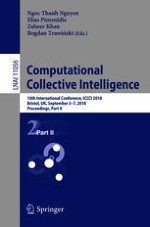2018 | OriginalPaper | Chapter
Cluster-Based Instance Selection for the Imbalanced Data Classification
Authors : Ireneusz Czarnowski, Piotr Jędrzejowicz
Published in: Computational Collective Intelligence
Publisher: Springer International Publishing
Activate our intelligent search to find suitable subject content or patents.
Select sections of text to find matching patents with Artificial Intelligence. powered by
Select sections of text to find additional relevant content using AI-assisted search. powered by
